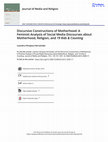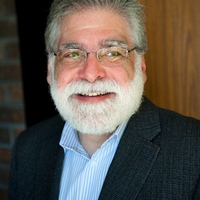Papers by Leandra Hernandez
Frontiers in Communication
This manuscript is a methodological intervention that addresses ethical considerations associated... more This manuscript is a methodological intervention that addresses ethical considerations associated with conducting research in outdoor spaces, particularly with communities of color and other marginalized communities. The core issue is that BIPOC individuals, LGBTQIA + individuals, and disabled individuals face discrimination and violence in outdoor/recreational spaces. By investigating these issues, scholars can intensify the problem. We hope that our perspectives can assist ethical decision-making processes in methodology, advocacy, and interaction with outdoor communities of color.
Journal of Autoethnography
Routledge eBooks, Jun 28, 2023
New femininities in digital, physical and sporting cultures, Nov 18, 2020
The International Encyclopedia of Health Communication, Nov 10, 2022
University of Arizona Press eBooks, Jun 7, 2022
Communication in the 2020s
QED: A Journal in GLBTQ Worldmaking, 2020
Frontiers in Communication, 2021
This manuscript is a methodological intervention that addresses ethical considerations associated... more This manuscript is a methodological intervention that addresses ethical considerations associated with conducting research in outdoor spaces, particularly with communities of color and other marginalized communities. The core issue is that BIPOC individuals, LGBTQIA + individuals, and disabled individuals face discrimination and violence in outdoor/recreational spaces. By investigating these issues, scholars can intensify the problem. We hope that our perspectives can assist ethical decision-making processes in methodology, advocacy, and interaction with outdoor communities of color.
Interrogating Gendered Pathologies, 2020
Meg 50 2.2 "Bloodlines" by Meg 51 2.3 "Failed IVF #1" by Sara 53 2.4 "Picture Your Fertility: An ... more Meg 50 2.2 "Bloodlines" by Meg 51 2.3 "Failed IVF #1" by Sara 53 2.4 "Picture Your Fertility: An Interactive Art Event" 60 2.5 Meg's "My Consent" at "Picture Your Fertility: An Interactive Art Event" 60 2.6 Michigan Exhibit at Local Fertility Clinic 61 2.7 Exhibit at the Examined Life Conference 61 4.1 Air force medical personnel practice patient care on a male manikin similar to the one used by nursing students in this study. 87 4.2 Nursing instructors often use wigs to transform a male manikin into a female for the simulation.
The Southern Communication Journal, Feb 2, 2018

Journal of Media and Religion, Oct 2, 2019
This essay is a feminist analysis of social media discourses about motherhood, religion, and the ... more This essay is a feminist analysis of social media discourses about motherhood, religion, and the reality television show 19 Kids & Counting. Social media discourses about the Duggar family and the relationship between motherhood and religion reveal important connections among audience digital interactivity, the role of motherhood in the series, the disconnect between representations of Christian motherhood in the series, and constructions of good and bad motherhood within religious contexts. This study provides support for the theory of digital interactivity and highlights disconnects between positive representations of Christian motherhood in 19 Kids and Counting and discourses surrounding Christian motherhood and Michelle Duggar on Twitter and Facebook. Ultimately, social and cultural understandings of media representations of religion and motherhood could be enhanced by more feminist theology perspectives. Motherhood has become an increasingly contested institution and role situated within larger feminist, evangelical, and political debates about reproductive rights, abortion, reproductive restrictions, and the essentialist and gendered belief that women's primary role and function is motherhood. At the forefront of these debates is the Duggar family, the star family of The Learning Channel's (TLC) 19 Kids and Counting series and one of the U.S.' most well-known Quiverfull families from Arkansas. This reality television series, which chronicled the lives of Jim Bob and Michelle Duggar and their 19 children, aired on TLC from 2008-2015 and was canceled amidst family sexual abuse allegations and controversies. 1 In this reality television series, the Duggar family espoused traditional conservative and religious ideologies pertaining to marriage, sexual relations, relationships, modesty, and motherhood. An influential and farreaching television program, it was TLC's most popular television series with an estimated 2.3 million viewers per episode and $25 million dollars in advertising revenues annually (Bibel, 2015; Pai, 2015). The series' viewership provided the Duggar family the opportunity to promulgate its conservative, evangelical ideologies to larger audiences and disseminate its patriarchal, religion-based ideas about gender, marriage, and reproduction. Dominating national discourses about mandatory motherhood, family, and sexual abuse in light of the oldest Duggar son's alleged abuse of two of his younger sisters during their youth, political, cultural, and discursive debates about motherhood have strong ties to the role of religion and the Duggar family's influence in evangelical, religious, political, and media spheres. Thus, in order to further understand the relationship between motherhood in the Quiverfull movement and in 19 Kids and Counting, utilizing feminist theories on motherhood and maternal subjectivities, this article explores how Christianity and motherhood are represented in social media discourses about the Quiverfull movement and 19 Kids and
Routledge eBooks, Jan 12, 2023
My most revolutionary act as an activist-scholar is one that bridges my family (as community) wit... more My most revolutionary act as an activist-scholar is one that bridges my family (as community) with my labor in the academy.
Journal of Applied Communication Research, Sep 3, 2022
Women's Studies in Communication, Apr 3, 2019

This dissertation explores Mexican-American women's experiences with prenatal testing, more speci... more This dissertation explores Mexican-American women's experiences with prenatal testing, more specifically the amniocentesis procedure. Utilizing health communication theories and Chicana feminist theories as my theoretical lenses, I explored the social construction of the amniocentesis procedure for Mexican-American women, as well as the role of their family members and healthcare providers in their decision-making processes. An intersectional feminist thematic analysis was conducted of 30 semistructured, in-depth interviews with Mexican-American women between the ages of 30 to 45 in Houston, Texas and San Diego, California. Ten themes emerged from the data and presented a portrait of the information processing and decision-making processes that the participants went through as they deliberated whether to undergo the amniocentesis procedure. Of the 30 participants, only one underwent the amniocentesis procedure; the other 29 participants refused the amniocentesis procedure because it would not change the outcome of their pregnancy, because they did not see a need for the information the amniocentesis could provide, and because their families would support them in their decision to not abort a child with a disability. Moreover, participants noted that their spouses and family members were very encouraging during their decision-making processes, which further solidified their decision to reject the amniocentesis procedure. Lastly, participants spoke of their physicians' role in the amniocentesis, and most noted that their physicians supported their decision. Participants preferred physicians who spoke to them in a caring manner and disliked when their physicians did not explain health-related information with them iii or take the time to establish a relationship with them. These findings provide a new snapshot of what the amniocentesis experience is like for Mexican-American women. Participants refused the amniocentesis, but not for reasons that have been supported in past academic literature. Moreover, participants provided a new conceptualization of what a "healthy baby" is and looks like-a fetal anomaly or congenital disorder was not framed as negative, unhealthy, or undesirable. This conceptualization of "what a healthy baby is" was situated within sociocultural factors such as family support, strong spiritual values, and a maternal/fetal fusion with their children. Lastly, given the delicate nature of this prenatal procedure, physicians should be more empathetic and more caring. This communication style would make patients more comfortable and create a more satisfying healthcare experience. iv DEDICATION This dissertation is dedicated to Maria del Pilar Contreras Montoya, my grandmother, and Ernestine Hinojosa Hernández, my mother, for blessing my life with their selfless and unconditional love and teaching me about the beauty of motherhood; Froilán Antonio Hernández, my father, Alexandria Hinojosa Hernández, my sister, and Pedro Luís Arturo Ortega, my husband, for their never-ending support and love; and to my participants, for taking the time to share their life experiences, stories, joys, and tears with me. I am forever grateful for their presence in my lives. v ACKNOWLEDGEMENTS Barbara Katz Rothman (1986) once stated, "Especially important to any book are the people who had faith in it early on, when it was loosely formed, not written, and very fragile" (p. xvii). Without the support of the following people, my dissertation would have never progressed from its fragile state to its completed state. First, I would like to express deep gratitude to my dissertation co-chairs, Dr. Richard L. Street, Jr. ("The Highway Man") and Dr. Tasha Dubriwny, for taking me under their wings four years ago. They helped me transform the floating ideas roaming around in my head into a coherent, communicable research agenda. I have learned so much over the past few years from them about patient-provider communication, culturally competent communication, feminist health communication, reproductive rights, and motherhood. By combining their expertise and using it as a starting point for my ideas, I was able to finally establish myself as a feminist health communication scholar and reconcile my scholarly identity crisis that plagued me during the first year of my program. I cannot thank them enough for their unwavering support of my research ideas, their constant and expert feedback, and for their mentorship. Second, I would like to thank my committee members for their guidance and support during my doctoral program. Dr. Antonio La Pastina not only served as my methodology advisor for my dissertation, but also as a close colleague and friend. Our conversations about race, ethnicity, sexualities, and life were invaluable and meant so much to me. He and Dr. Joan Wolf, my other committee member, truly helped me en/re/vision ways to conceptualize and discuss the oft-problematic term "culture," as vi well as the relationships between culture and gender. I am truly thankful for their support and conversations. (SGRJ!) Their research, their expertise, and the conversations we have had together in the past have helped me reconceptualize how I approach my main research topics and inspire new research questions for future research. Also, although she was not on my committee, I would like to thank Dr. Kristan Poirot for her support and feedback. After taking her sex and feminism course last year, I was inspired to add new lines of inquiry to my research agenda. She helped me make sense of what I thought were irreconcilable topics, and I am thankful for her continued support of my writing and her excellent feedback. In addition to my committee members and professors, I would like to thank the Department of Communication and the Department of Women's & Gender Studies at Texas A&M University. Both departments not only offered wonderful spaces of support and collegiality, but they also provided grants that supported my research at all phases of development. The Department of Communication provided a mini-grant that helped me conceptualize the early phases of my dissertation, and the Department of Women's & Gender Studies provided a Dissertation Fellowship Award that supported my literature review and analysis stages. Next, I would like to thank my close friends and colleagues for their love and support. Patricia Froning (Munchkin), Megan Hoskins (Maggie), and Sara Mathews have been lifelong friends who have always supported me and been there for me. I am thankful for their support and for their presence in my life. Patricia served as a key informant and was an integral part of my dissertation when she helped me recruit vii participants in Houston. Alondra Hanton also deserves thanks for serving as a key informant and assisting with participant recruitment in San Diego. While at Texas A&M, I was lucky enough to meet colleagues who turned into close friends and even family members. I would like to thank fellow scholars
Communication Teacher, May 17, 2021
ABSTRACT In this article, we welcome the reader into our embodied teaching experiences. We invite... more ABSTRACT In this article, we welcome the reader into our embodied teaching experiences. We invite the reader into our classrooms to see how our social justice pedagogies occur in real time and are experienced by the intersections of our race/ethnicity, gender, and sexuality. In this article, using narrative vignettes and autoethnography as our method, we explore the following research question: What contradictions and tensions characterize the relationship between traditional approach instructional communication and social justice/critical pedagogies? We discuss the concept of embodied positionalities, which we refer to as teaching from the flesh, and we introduce several short vignettes that highlight the intertwined nature of our identities, embodied teaching, and the importance of social justice activist approaches to communication pedagogy.
Routledge eBooks, Apr 11, 2023
The International Encyclopedia of Health Communication, Nov 10, 2022











Uploads
Papers by Leandra Hernandez